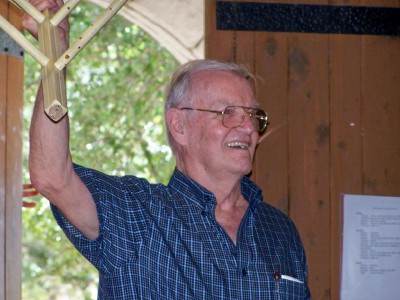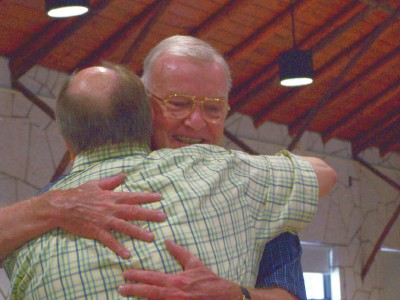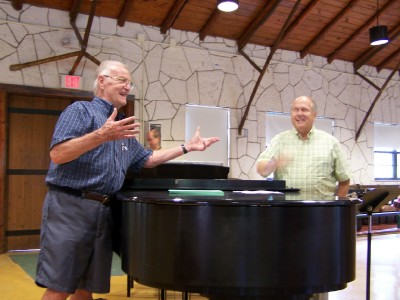 Dr. Robert R. Ball
Dr. Robert R. Ball
_ I I I I I I I I I I I I I I I I I I I I I I I I I I I I I I I I I I I I _
_ _
_ _
_ I BELIEVE THAT GOD BELIEVES IN CLAUDE _
_ _
_ _
I I I I I I I I I I I I I I I I I I I I I I I I I I I I I I I I I I I I I
Sermon by Dr. Robert R. Ball
first presented
September 27, 1970
 |
_ I I I I I I I I I I I I I I I I I I I I I I I I I I I I I I I I I I I I I I _
_ _
_ _
_ I BELIEVE THAT GOD BELIEVES IN CLAUDE _
_ _
_ _
I I I I I I I I I I I I I I I I I I I I I I I I I I I I I I I I I I I I I I I _
John 20:24-31
Sermon by
Dr. Robert R. Ball
Memorial Drive Presbyterian Church
Houston, Texas * September 27, 1970
To say, “I believe in God,” isn’t to say much; but to say, “I believe that God
believes in Claude,” is to say a great deal – especially if you are Claude.
That line, “I believe in God, and I believe that God believes in Claude,” is from
the stage play “Hair,” admittedly an unlikely source of sermon material. The play
is a ripping, tearing protest – much of it filled with obscenities. It desecrates most
of the institutions and traditions that are sacred to our way of life. The protest is
much too violent for my apetite, but that has nothing to do with whether or not
those feelings of protest really exist – AND THEY DO EXIST! Even if (as I think)
the protest is far too exaggerated, we can hardly deny that it has some basis in
truth. Hopefully, we are courageous enough to face up to the truth.
It is true that a lot of us go around saying, “I believe in God”; but that believing
has very few good or important consequences in determining how we live.
*If the God we believe in is a God who really prefers white people
to blacks, then any denial of opportunity the blacks must suffer won’t
worry us too much.
*If the God we believe in is a God who helps the man who helps
himself, we will feel quite justified in helping ourselves to whatever we
may please.
*If the God we believe in isn’t really involved in what happens in the
world, he won’t get in our way very much, but neither will he be of
much help.
Many people say they believe in God, but then they make up their own ideas
about what God is like. What they end up with is no more God than they are. In
fact, what they call God is no more than a creation of their own minds and
emotions.
That’s the hypocrisy against which the kids in “Hair” are registering a
legitimate protest. When Claude in the play sings, “I believe in God, and I
believe that God believes in Claude,” he is much closer to the biblical faith than
what many straight-laced Christians believe; and that is a faith that will change
your life.
I.
There aren’t too many people today who are convinced that what a person
believes makes that much difference. You often hear it said, “It’s not what you
believe that counts but what you do.” That just isn’t so. It is true that I would much
prefer to have someone be kind to me rather than have him stand there and say
he believes in kindness. Nevertheless, what you say you believe may or may not
be of much consequence, but what you do will be a direct reflection of what you
really, really believe. Faith is what makes the difference.
I have seen tragic death occur in many families. The heartache and pain are
always there, but the reactions vary considerably. In one family you hear,
“I’m never going to hope for anything good ever
again. This proves it. Life is bad. If there is
a God, which I doubt, he is insensitive and unfair
or this would never have happened.”
Another family, suffering from a similar tragedy and feeling just as much
sorrow and loss, makes quite a different response. They say something like,
“This is the hardest thing I’ve ever had to face,
but somehow I can’t help feeling grateful to God
that he permitted us to share in the life of this
loved one for these years. I know that all of us
are more loving and more mature persons
because he was here.”
For both families the facts are the same; but the interpretation they make of
those facts is quite different. That difference of interpretation is a difference of
faith – a difference in the way that they look at life. That difference of faith will give
each of those families a very different kind of life. For one it will be a life of
bitterness and cynicism; for the other it will be a life of compassion and
understanding and hope. Faith is what makes the difference.
It is easier to see in crisis situations, but the truth of this point is just as real in
our day to day living. How we live reflects what we really believe. If a man is tight
with his money, it probably means that he is a very insecure person. He believes
that his money will make him an adequate and strong person. If a man is
impatient and rude, it probably means that he has little confidence in himself, and
he believes that people would take advantage of him if he let them. If a man is
withdrawn and shy, he probably has little confidence in himself also, but he reacts
differently. He believes that if he stays out of the way he can’t be criticized.
We do not arrive at our faith as a result of rational analysis. Hopefully, we will
be willing to examine our faith rationally, but at the outset it is a reflection of how
we feel about ourselves in the world. The man who refuses to believe in God has
no evidence for his claim. It’s just that he believes that he is all alone in the world
to make out as best he can. If that’s what he believes, that’s how he’ll live. Faith
is what makes the difference.
II.
When Claude sings, “I believe in God, and I believe that God believes in
Claude,” he is saying how he feels about being who he is living in this world.
From a psychological standpoint, that is the most important faith a person can
have: the ability to believe and have confidence in yourself. Most of us have a
great deal of trouble believing in ourselves, let alone believing that God believes
in us.
To believe in yourself is to believe that your life is good; that is the faith that
makes life possible. It is also the hardest thing a man will ever try to believe. It’s
much easier to believe in all the miracles of the Bible than to believe that life is
good. how can we be sure our lives count, that we have something important to
contribute? How can we be sure of ourselves in the midst of disappointment
and rejection? How can we be sure that life is moving to some good and
meaningful purpose when we are surrounded by so much disruption and misery
and revolution on all sides?
It is especially hard for us who have been reared in a day when science is
king. We have been taught to believe that anything that is true can be rationally
explained and understood, but today the highest ranking scientists are saying
that there is no such thing as absolute certainty on the basis of statistical or
factual evidence. We can’t even believe in science. It hasn’t produced the
peaceful and happy world it once seemed to promise. What can a man believe in
in a day like ours?
That’s what makes us so much like Thomas in this morning’s lesson from
scripture. Thomas was a dogged skeptic. He wasn’t about to believe anything
until it was proved. He demanded to see the evidence with his own eyes and to
feel it with his own hands. Jesus had told him that God is love, and that God’s love
rules the world. Thomas wanted to believe it, but he couldn’t. How could he when
he had seen God’s own Son crucified by human greed and hate?
Thomas interpreted that to mean that God was ineffective and that God’s love
was weak. So he just couldn’t make himself believe that life is good and
meaningful, no matter how he wanted to. He was too rational and realistic for
that. Thomas couldn’t say, “I believe in God, and I believe that God believes in
Thomas.”
III.
A year ago last spring I heard Charlie Shedd give a lecture on child rearing.
At the end of the talk, a highly articulate man from the audience stood to ask,
“All you have said assumes the existence of a
personal, loving God. How can you hold to such
a faith in a world of concentration camps and
famine and sickness and human brutality?”
The only answer to that question is a Christian answer. I believe in that kind of
a God because that’s how God has shown himself to be in Jesus Christ. Jesus
Christ does not deny the horrible pain of man’s hatred for man. He was himself a
victim of it, but he shows us a life that triumphs over hate. Jesus Christ does not
deny that the world is full of enormous disappointment and frustration. He
experienced all of it, but it could not destroy him. Jesus Christ does not deny the
agony of loneliness. As he hung on the cross, he felt separated even from God,
and he cried, “My God, my God, why have you forsaken me?” But even in that
horrible moment he did not give up on God. Instead he addressed his cry to God,
and God did not desert him.
When everything seemed totally meaningless, Christ continued to believe in
a personal, loving God of meaning. That is the faith that has turned our world on
its head. We can interpret life in terms of our own doubts and fears, or we can
interpret life in terms of Christ. One or the other will be our faith. Faith does not
depend on ecstatic, emotional experience. It depends on the decisions we make
about Jesus Christ.
Thomas was confronted with the power and the love of the risen Christ. Jesus
said,
“Do you want to handle my scarred feet and
hands, to put your fingers in my wounds? Do
not be faithless, but believe.”
Thomas chose to believe. Perhaps he recognized that a faith born of a crude
handling of Jesus’ body would not be faith. Perhaps he discovered that life is
found not in evidence but in trust. Whatever the reason, Thomas quit asking for
proof that could not be given. He didn’t demand a mind-blowing experience to
authenticate his faith. He could do nothing but say,
“My Lord and my God!”
Thomas didn’t notice that suddenly he had become a believer. Things that
had been red did not suddenly become green. He didn’t say a word about the
rapture of the experience. He simply knew that from that point on he would be
living in a world whose God is like Jesus Christ. It was a new faith, a new way of
looking at life. Now he was full of hope and possibilities. To live in a world where
that kind of God is God is to live a different kind of life; it is a life that is good and
meaningful. Now Thomas could have said,
“I believe in God, and i believe that God
believes in Thomas.”
Last Sunday afternoon I received a call from a Church School teacher of one of
our high school classes. She was disturbed that when these young people, all of
whom are church members, were asked to say what they believe they had
absolutely nothing to say. Since what we believe determines what our lives will be,
that is a problem well worth being concerned about. I suspect it would be equally as
difficult for many of us who are adults.
I’d like to make a suggestion as to a place for us to begin in stating our faith. It
is a beginning that is both faithful to the Bible, and helpful in producing a positive
approach to life. It is the line I borrowed from “Hair.”
“I believe in God, and I believe that God
believes in Bob” (or whatever your name
happens to be).
When I believe that, I no longer need to fear that my life is the helpless victim of a
sinister nothingness. I believe this world has a God in it. When I believe that, I no
longer need to put other people down to build myself up. If God believes in me
then I can believe in myself. When I believe that, I no longer have to give myself up
to despair. If God believes in me, I can continue to look for meaning in every crisis.
When I believe that, I can quit trying to prove God or myself or anything else. I am
free to live and to love and to help and to hope. The God of life believes in me!
Such a faith would be a pious pipe dream in this world of tragedy and rejection
and man’s inhumanity to man except for one thing – or rather, except for one
person. I believe that Jesus Christ is the truth about God, about life, about me. I can
only bow before him and say with Thomas, “My Lord and my God.”
 |
Photos of Joyful Noise/Joyful Echo Reunion, August 6-9, 2010
Allen Pote and Robert R. Ball
The instigators.
 |